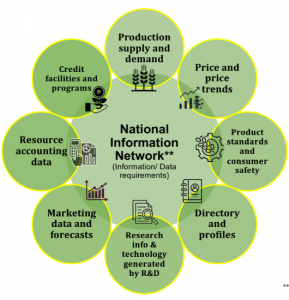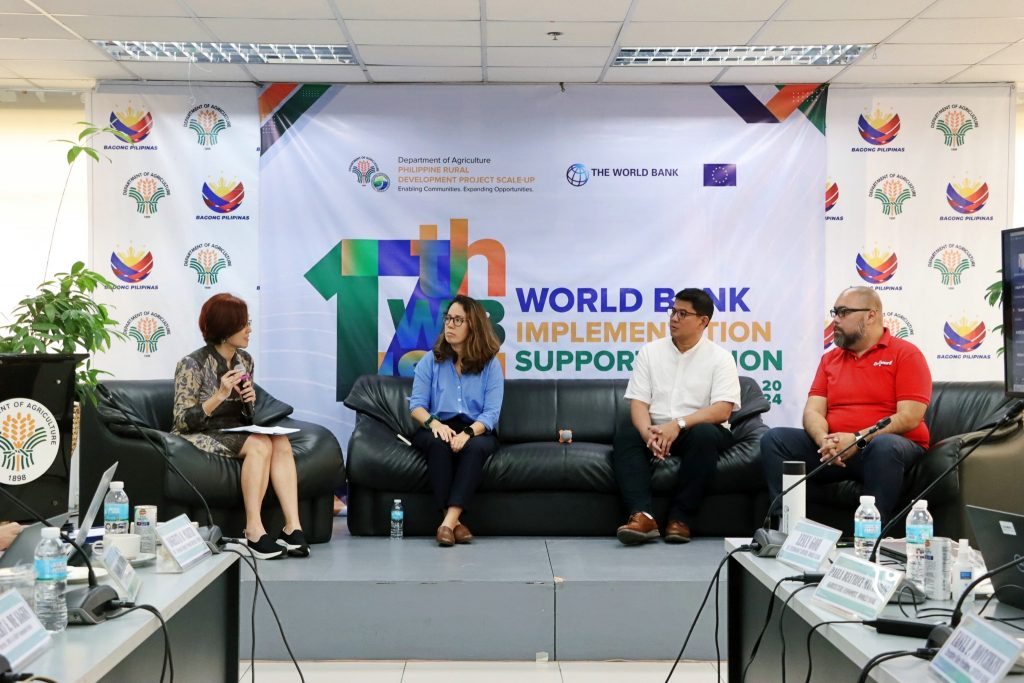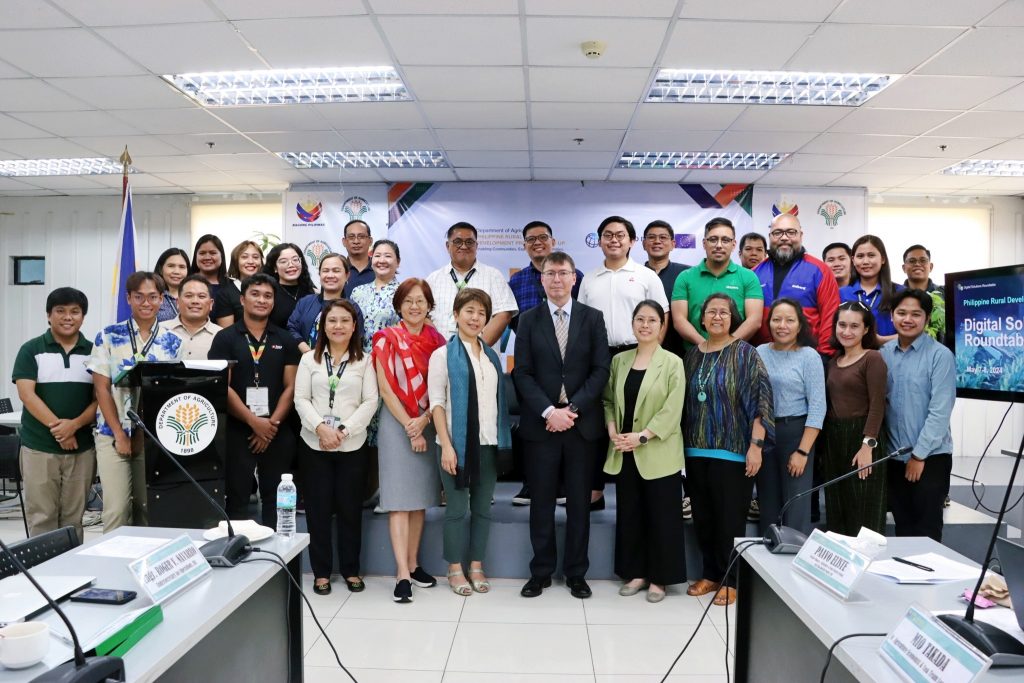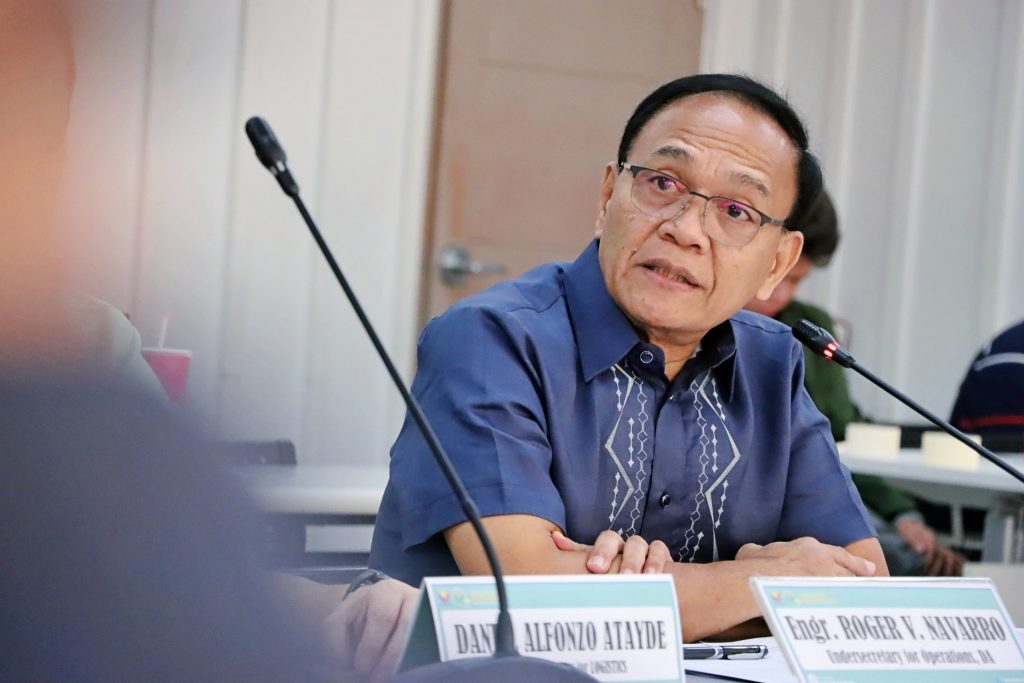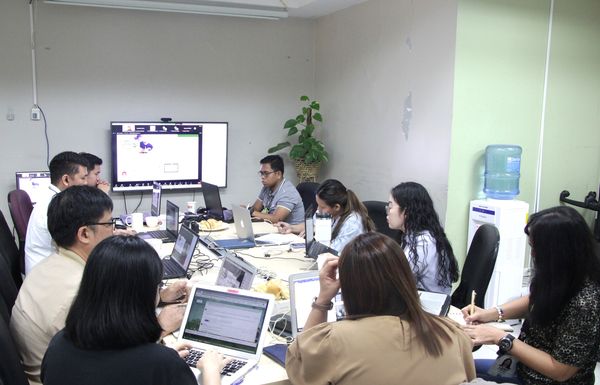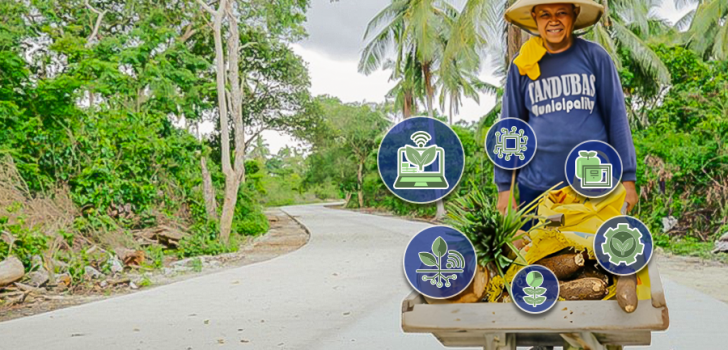
The Digitalization of Philippine Agriculture: How a World Bank-funded project is making headways
I. A modern, productive, and resilient agriculture sector
The Department of Agriculture’s (DA) vision to modernize the Philippine agriculture sector highlights digital transformation as one of the strategic priorities to attain increased productivity and food security.
Under the leadership of Secretary Francisco P. Tiu Laurel, Jr., the DA unveiled its three-year plan where digitalization is poised as a key strategy for science and information-driven decision-making in the sector.
As various digital initiatives have been developed for the sector, there is an increased recognition of digital fragmentation within the organization. Thus, integrating and harmonizing these various digital platforms is a top priority to streamline the digital system of the DA and facilitate timely and reliable access to information, resources, and services.
The National Information Network (NIN) is set up to lead the ICT-based integration and harmonization of digital platforms, focusing on establishing agricultural digital transformation systems to enhance data management and monitoring and forecasting systems utilizing artificial intelligence, machine learning, and weather intelligence.
The NIN is designed to link with relevant research institutions, national government agencies, local government units, and the private sector for ease of agri-fishery data access and utilization espousing an inclusive, market-based, private-sector-led and government-enabled system.
Agriculture transformation likewise underscores collaboration among various government and non-government stakeholders, thus calling for multi-sectoral participation throughout the transformation process. With digitalization, private sector partnerships through agri-tech and fin-tech companies unlock wider opportunities for technology-enabled efficiencies and financial mechanisms that encourage more sustainable investments and market access at lower risks.
Secretary Tiu Laurel has actively invited the private sector in various forums to invest in agriculture. Coming from the business sector, he believes that actively engaging various sectors to build support for the agri-fisheries sector’s initiatives will help realize the goal of food security in the country.
Among the DA’s flagship programs, the Philippine Rural Development Project (PRDP) Scale-Up, a World Bank-funded project, has been positioned at the forefront of advancing digital transformation, building on its 10-year track record as a catalyst of science-based tools and innovations in agriculture and rural development.
The PRDP Scale-Up has created its Digital Agriculture Team in response to the DA’s digital transformation agenda and has organized a Digital Solutions Roundtable as a kickoff activity to meet with agri-tech and fin-tech companies to explore opportunities that will expand the capacities of the farmers and fisherfolk beneficiaries through their digital solutions.
II. Digital Solutions Roundtable: Scaling up the digitalization of the PRDP
The DA has encapsulated the digitalization agenda in its 3-year agenda culminating in an integrated National Information Network that harmonizes digital platforms to enable data and evidence-driven policy-making in agriculture. This includes integrating numerous digital solutions across the value chains in the agri-fisheries sector.
The Digital Solutions Roundtable on May 7-8, 2024 was important to accelerate digitalization at scale and enable innovation and adoption of technology, especially at the enterprise and farmer levels.
With the growing digitalization agenda, the timing is perfect to highlight technology’s role in enhancing public services, streamlining governance, and fostering economic growth. This Solutions Roundtable allowed the PRDP and its partner farmer cooperatives and associations to explore opportunities to scale up operations through digital platforms.
We were delighted to see a strong showing of partnership among FCAs, PRDP, and the agri-techs showcased. We see a few promising pilots of agri-tech integration into PRDP to innovatively bring out improved efficiencies in the government’s service delivery.
The discussions covered innovations aiming to reach scale for productivity and resource efficiency, through the digitalization of the value and supply chain as well as exploring innovative ways to make credit financing viable. There are real opportunities here to further the partnerships that will allow FCAs to tap into emerging markets and address key financing and logistical bottlenecks.
This audience included government, funding agencies, and the private sector to exchange ideas about the digitalization of agriculture through platforms that provide economies of scale and efficiencies from production, consolidation, and marketing. The two-day event explored how existing technologies and data-driven approaches could be harnessed to enhance efficiency and transform agricultural practices through digital transformations. The sessions highlighted the critical collaborative efforts between the public and private sectors in fostering the growth of agri-tech, which is still in its early adoption stages in the country.
As emphasized by DA Undersecretary for Operations Engr. Roger V. Navarro, leveraging digital technology as a strategic approach to transform the agricultural landscape is already being piloted in the DA.
“Through these digital innovations, the Department endeavors to streamline the process, bringing together the private sectors, agribusiness companies, financing institutions, innovators, and the academe, both locally and internationally, to converse and converge on strategic pathways for strengthening science and information-driven decision-making through the digitalization of the agri-fisheries sector.”
There were a few key recommendations from the event:
- Accelerate the development of Digital Public Infrastructure in rural areas (e.g. Soil Health)
- Institutional architecture: Establish a Digital Transformation Office to develop the Data Culture and catalyze the digital innovation ecosystem.
- Foster collaborations with the private sector (e.g. off takers, input suppliers, etc.)
- Invest in young farmers and youth empowerment.
- Invest in capacity building and training farmers and cooperatives in digitalization and modern agriculture practices.
For more details about the Solutions Roundtable: 17th WB-ISM Portal | Digital Solutions Roundtable Portal | DA-PRDP Facebook Post | Linkedin
III. The role of Agri-techs in the digitalization of the PRDP
Homegrown agriculture technology or agri-tech companies like Mayani, AgroDigital Ph, and FarmKonekt, all present at the Solutions Roundtable, are leading the digital transformation of the agriculture sector alongside the DA. By harnessing the power of modern-day technologies, these agri-techs provide effective solutions to the most persistent problems that hamper the development of Philippine agriculture and offer a fresh approach to a traditionally conservative sector.
Mayani, AgroDigital Ph, and FarmKonekt at the Digital Solutions Roundtable
Acknowledging the potential and contributions of these private-sector innovators, the DA embraces and takes inspiration from their digital innovations that have already shown real, positive results, especially on the productivity and incomes of farmers.
One of the leaders in the local agri-tech space is Mayani. It has empowered local farmers and communities by creating what they call a “sustainable pathway” for their produce to reach markets. Digitizing the supply chain, from input and consolidation to production and marketing, allows Mayani to directly and successfully link farmer’s associations with institutional buyers such as supermarket chains, food brands, international hotels, and food processors.
At the center of Mayani’s digital innovations is their Farmer’s Companion Tool, a farmer-facing tool that helps farmers efficiently plan, manage, and market their produce with just a few taps on their phones. This data-driven tool eliminates risks that may spoil the farmer’s harvest due to poor planning, production management, and marketing.
The tool also gives Mayani a direct line of sight over the farmers’ production, providing them with the necessary data to make accurate forecasts on demand and supply, and to empower farmers to make informed decisions on the management of their farms. This digital mode of farming has cut farmers’ losses and boosted their incomes.
Ka Felix, a farmer from Lian, Batangas attests to this.
In the PRDP Scale-Up, agri-techs like Mayani will play a more active role in implementing rural enterprises. The PRDP will engage agri-techs to enhance its supported enterprises’ operations and capacitate the Farmer’s Cooperatives and Associations (FCAs) on digitalization. The FCAs will also benefit from the digital innovations of the agri-techs such as Mayani’s Farmer’s Companion Tool, among others. With this partnership, the PRDP aims to scale up its digitalization efforts to further contribute to the DA’s digitalization plan and ultimately, the modernization of Philippine agriculture.
IV. How farmers will benefit from digitalization
The PRDP, through its Enterprise Development (I-REAP) Component, has empowered the FCA beneficiaries to adopt digitalization in their enterprises by conducting a Digitalization Webinar facilitating the linkage to agri-tech innovators. The webinar was attended by FCA beneficiaries profiled based on their readiness to adopt digital platforms. The linkage activity to the agri-tech innovators included the access to markets and financial services of the FCAs.
A prominent result of the activity was the onboarding of various I-REAP FCA beneficiaries to the agri-tech platforms. The Benguet Arabica Coffee Enterprise (BACE) , consisting of cluster members from the various Benguet coffee farmer groups, used Mayani’s Farmer’s Companion Tool. BACE is a subproject funded under the PRDP Original Loan which seeks to strengthen and develop a viable arabica coffee enterprise in the province of Benguet. The subproject aims to increase the enterprise’s productivity and the marketability of their arabica coffee.
Through the Farmer’s Companion tool, BACE was identified to supply Arabica Green Coffee Beans (GCB) to Mayani. Currently, an ongoing discussion of the details of the initial purchase order between the Mayani and BACE is being facilitated.
Another successful utilization of the Mayani platform is the onboarding of the PRDP Scale-Up potential implementing proponent, the Taloy Farmers Multipurpose Cooperative (TAFARMCO). TAFARMCO is a farmer’s multipurpose cooperative in Tuba, Benguet which is engaged in the production and consolidation of agricultural commodities such as highland vegetables and other commercial activities. This enterprise was onboarded to Mayani’s Farmer’s Companion tool.
Similar to the case of the BACE, TAFARMCO’s produce was assessed based on the specification of Mayani and was identified to supply highland vegetables. Negotiations on the purchase quantity and frequency are being done. More importantly, TAFARMCO has engaged Mayani in the development of a business plan that involves digitalization at the onset of their business operations. The business plan is an integral part of their proposal for funding for the PRPD Scale-Up. They intend to integrate the use of the Mayani platform into their business operations.
These are some of the key developments of the digitalization of FCAs in the PRDP. The I-REAP component will further promote and require innovative technologies and digital platforms in the PRDP Scale-Up enterprises.
Seeing the limitations of the FCAs in their knowledge of various agri-tech platforms, the component will act as a catalyst to match the private sector innovators to the PRPD I-REAP enterprises. Additionally, the technical expertise in the utilization of digital platforms was a limiting factor to the FCAs in their readiness to adopt digitalization. Thus, the component will provide training and capacity-building activities on digitalization.
These developments complement the DA’s initiatives on digitalization, with the PRDP focusing on engaging and capacitating the FCAs.
V. A new era for Philippine agriculture
This marks the beginning of a new chapter in the DA and the PRDP, a chapter that will hopefully propel Philippine agriculture into the future. There is no better time to begin this journey toward digitalization than now when the technologies are ripe and the opportunities present themselves.
It is now up to the DA and PRDP to sustain their momentum and deepen their ties with the private sector to complement their digitalization plans. For this endeavor to materialize and become sustainable, it should be a collaboration between the public and private sectors, pooling their manpower and resources to benefit not just the agriculture sector but the whole value chain.
Ultimately, the direct beneficiaries of digitalization are the farmers and fishers and the millions of Filipinos who rely on them for their daily nutrition. We will hear more about their stories and their experience with digitalization in the next blog.###
Authors: Lesly Goh, World Bank Senior Technology Adviser | Charmela Famor, PRDP ODPD | Jan Kyle Carrillo, PRDP InfoACE Unit | Anna Monica Vista, PRDP I-REAP

